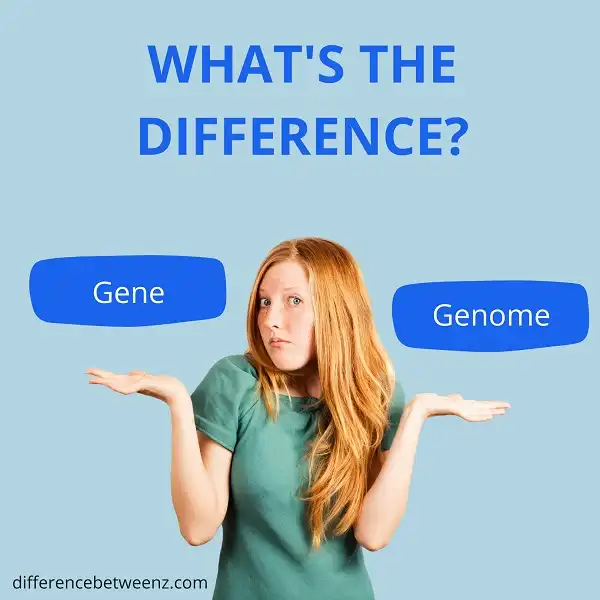Gene Vs. Genome
What is the Difference between Gene and Genome? There are diverse species present in the world and each has a unique set of hereditary characteristics that make them different from the others.
These characteristics are encoded in the DNA molecules, present in the cells.
Genes and the genome are associated with DNA and are defined by the same molecules.
DNA is the basic unit of heredity found mainly in the chromosomes present in the nuclei of cells of almost every known organism.
But it is important that you know that gene and genome are not the same, which is why we then explain to you what the Difference between Gene and Genome is.
Is Gene Short for genome?
The genome is the overall genetic material of an organism that includes both non-coding sequences and genes.
While Genes are made up of DNA. Some genes act as instructions to make molecules called proteins.
Difference between Gene and Genome
Gene
A gene is a molecular unit of heredity in a living organism. Living things depend on genes and the functional chains of RNA and proteins.
Genes contain the information to build and maintain the cells of an organism and pass the genetic traits to offspring.
This is ignored as they are elements that determine the inherited characteristics that are transmitted from parents to their offspring in reproduction.
They are associated with DNA molecules, which are the main genetic material found in all living organisms.
What do you mean by gene and genome?
Genes are made up of specific segments or portions of DNA. These specific segments are able to control the specific characteristics of the inheritance.
This is usually done by DNA transcription and translation processes.
During reproduction, offspring obtains genes from both parents. These different forms of genes are called alleles.
A single allele or multiple alleles are responsible for controlling certain features and functions of an organism.
Genome
In molecular and genetic biology, the genome is the totality of hereditary information of an organism. It is encoded in DNA molecules.
The total DNA content in a single cell is known as the ‘genome’ of the organism, but some organisms have the only RNA so their genome is the total amount of RNA content.
From the foregoing, it follows that the genome includes both DNA and RNA. For this reason, the genome part is even of non – chromosomal genetic elements such as viruses, plasmids.
The total DNA content of the nucleus of a cell is called ‘nuclear genome’ and the total DNA content of mitochondria is called the ‘mitochondrial genome ‘.
The study of the genome and characteristics related to organisms is called genomics.
The evolution of genomes can be studied and identified by their composition, which includes size, proportion, repetitive and non-repetitive DNA.
If we consider the human genome, it contains 23 chromosomes and of this only one chromosome determines sex, while the remaining 22 are autosomal chromosomes.
There are approximately 20,000 to 25,000 genes in the human genome.
Since 1990 the Human Genome Project was carried out to identify and determine the chemical bases of DNA.
Key differences between Gene and Genome
- Genes are inheritance units composed of DNA and occupy a fixed position on the chromosomes, while the genome surrounds the set of genes contained in a chromosome.
- Genes are segments of DNA, while the genome is the total content of these in the cell.
- Genetics is responsible for the study of genes, while genomics deals with the study of the genome.
- An organism has billions of genes, but only one genome.


